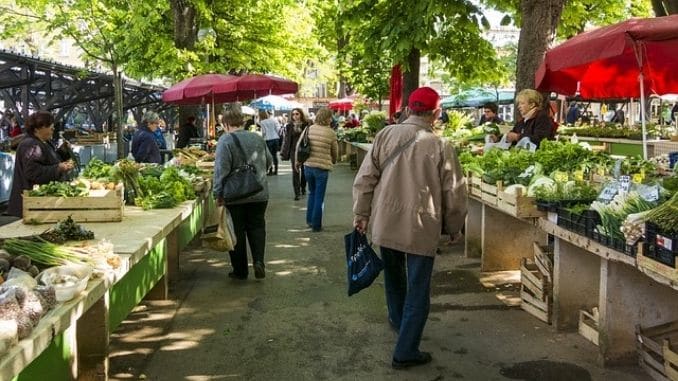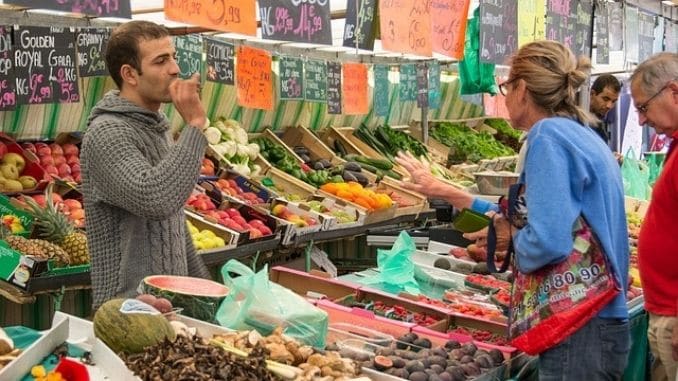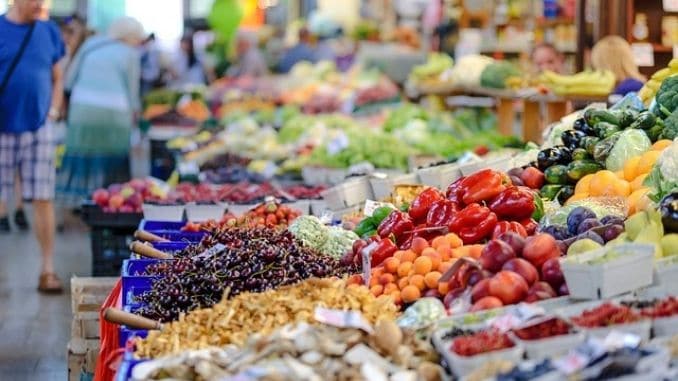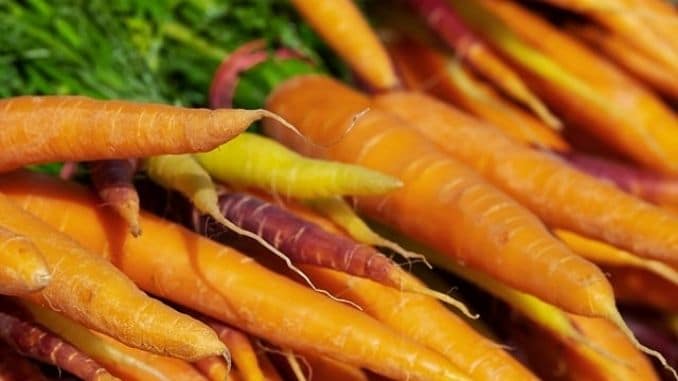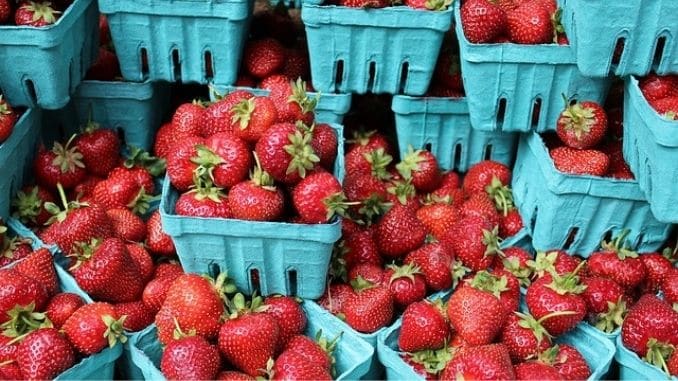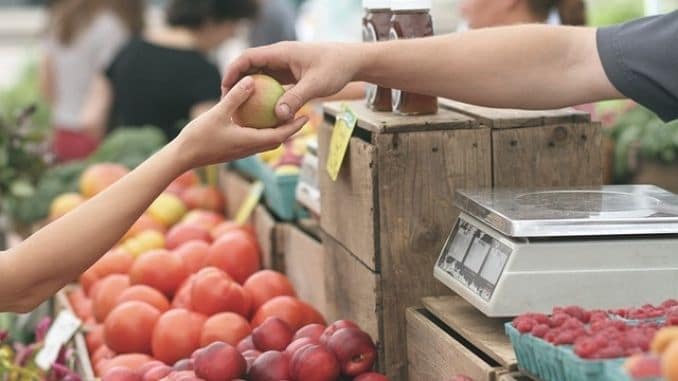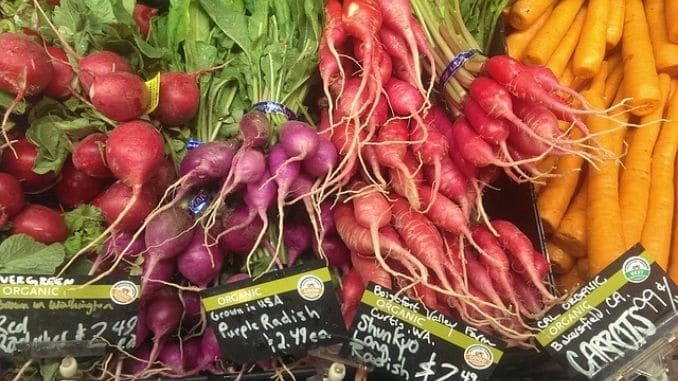
Have you gone to your area farmers’ market yet? If not, you could be missing out on an easy boost for your health.
According to a study conducted with Farm Fresh Rhode Island, those who regularly visited the farmers’ market during the summer lowered their daily soda consumption by 25 percent and increased the number of vegetables they ate by 12 percent. More than one-third reported that their kids were more willing to eat vegetables from the farmers’ market too.
Do you need more incentives? We’ve got them for you below, along with recommendations for the best items you’re likely to find at your local market.
What Are Farmers’ Markets?
A farmer’s market is just what it sounds like — a public place where local growers can sell directly to consumers. Since the United States Department of Agriculture’s (USDA’s) Agricultural Marketing Service began tracking farmers’ markets in 1994, the number has grown to 8,720, an increase of about 7.07 percent from 2013. Total annual sales are estimated at $1 billion.
Although most farmers’ markets begin in the spring and end in the fall, some run year-round, such as those on the West Coast and in the southwest parts of the country. Growers or vendors pay a fee or percent of sales for booth space at a public place, often in a downtown area, then sell their goods directly to local consumers. Managers coordinate vendors and are often responsible for advertising.
Public markets have been in existence for centuries, but today’s modern farmers’ markets took hold in the mid-2000s when consumers began to demand healthier, fresher foods. Modern food production often leads to harvesting food before it fully ripens, potentially reducing its nutritional content and compromising taste. As a result, consumers yearn for a return to a time when food was fresher, juicier, and available in greater variety.
In addition to providing healthy, local food, today’s farmers’ markets also bring communities together. Farmers and neighbors meet and socialize, often exchanging ideas about nutrition, agriculture, and cooking, and consumers become more educated about where food comes from and what’s in season at what time of the year.
In fact, researchers have found that the coming-together aspect of farmers’ markets promotes healthy living. Attendees at these events seek out healthy foods, surrounded by other community members engaged in the same pursuit.The experience helps people focus more on eating healthy diets, and also promotes connection within communities in ways that are often missing in today’s world.
The potential benefits waiting for you and your family from farmers’ markets include:
- Freshness: Enjoy produce that is harvested at its peak of flavor and nutrition.
- Samples: Ask for free samples of the foods before you buy — most vendors will be happy to accommodate you.
- Variety: Find foods that you may not have tried before or new versions that add interesting tastes and textures to your meals.
- Healthy: Enjoy a shopping environment where you’re less tempted by processed foods, fatty snacks, and nutrition-free snacks.
- Education: Learn from vendors the best way to store and cook the items you buy.
- Environment: Be part of the change — locally grown products take less energy to deliver, and local farmers often use sustainable growing methods.
To find a farmers’ market near you, check your local advertisements or enter your ZIP code into the USDA’s National Farmers’ Market Directory.
Tips for a Successful Day Shopping at Your Farmers’ Market
If you’re heading out to your local farmer’s market, we have a few tips to help you go home with the best buys.
First, if you want the best selection, try to get there early. Markets are generally less crowded shortly after opening, providing you with access to the best goods before they run out.
On the other hand, if you’re looking for the best deals, sleep in a bit and go to the market shortly before closing. Vendors often discount their items in the hopes of selling them rather than having to carry them back home.
Next, be sure you take your own canvas or nylon bags. Plastic bags work in a pinch, but they can be overloaded quickly and may break open on your way home. Despite the prevalence of credit cards and debit cards replacing cash in many instances, several markets still prioritize cash transactions, so it’s advisable to have plenty of it with you.
Don’t be afraid to ask questions. One of the benefits of farmers’ markets is that you get to talk directly with the person supplying your food. Discover how the food was cultivated, learn the optimal storage methods, and find out how to prepare it. You may learn some great tips.
Finally, brush up on your knowledge of food preservation. Many of the best deals at farmers’ markets occur when you buy in bulk. Freezing, canning, and drying can all help your bottom line, and think how wonderful those foods will taste when the cold weather comes around again.
Items to Avoid at a Farmers’ Market
Most markets today offer a wide variety of items, from food to beverages to clothing and jewelry. Feel free to have fun, but be careful of the following:
Perfect Produce
Although we’re all attracted to the perfectly shaped apple or peach, it’s the less-than-perfect items that cost less, and they often taste just as good. Don’t let the occasional peck-mark or odd shape turn you off. On the other hand, make sure you avoid old, bruised, and rotten merchandise.
Out-of-Season Items
The best thing about a farmers’ market is you have access to in-season produce. Learn what’s in season in your area, and then avoid those items that have been around for a while, like an asparagus in September. Although most vendors are honest, some may be trying to pass off supermarket produce as homegrown.
Honey
Honey is a popular item at farmers’ markets, and if it’s truly grown near you, help yourself. But, often, the honey sold at these markets is sold via a third party and was trucked in long before the market opened. Check the label to be sure.
Meat and Seafood
Many markets offer organic and grass-fed meats at farmers’ markets, but there is a risk of contamination. Especially if these items are sitting out in the sun. Be cautious. For the safest option, get the address of the seller and get your meat directly from his or her store or farm.
Eggs
Although most of these will be fine, there is a small risk of bacterial contamination. According to a study from Penn State University, eggs from small flock. Such as those that are available at farmers’ markets―are more likely to give you a case of Salmonella enteritidis than mass-produced eggs. The risk is small, but if you buy from farmers’ markets, always make sure to cook the eggs thoroughly before eating.
Unpasteurized Dairy
Unpasteurized dairy products may harbor microorganisms that can make you sick. Use caution and buy only from farmers you know are careful about cleanliness. Your safest option is to purchase only pasteurized items.
10 Best Items to Buy at a Farmers’ Market
Although most any fresh-from-the-farm item will be healthy for you and your family, below are 10 of the best you can usually count on to taste better and cost you less than the corresponding alternatives at the grocery store.
1. Herbs
If you’re looking for fresh thyme, mint, parsley and similar herbs, look at your farmers’ market. The bundles of herbs you’ll find there are often larger than those in the store, taste better and you may also find a larger variety, including options you’ve never tried before.
2. Carrots
Don’t be surprised if you see colors other than the standard orange at the market. Farmers may have white or purple ones too, which can be fun to try. Some of these may even have more healthy antioxidants than the standard orange ones, but the orange ones are great too. Any of them are likely to taste better than what you get from the store.
3. Tomatoes
Does anything taste better than a fresh tomato just picked from the vine? Many of us have forgotten how delicious tomatoes can be because store-bought ones are often so tasteless. You’ll also find a wider variety at the market.
4. Asparagus
If you can get them during their short season, go for it. Those fresh, small twigs are so tender you may be tempted to take the whole supply. Plus, asparagus is highly nutritious and provides a refreshing change to your old vegetable standards.
5. Berries
Strawberries, blackberries, raspberries, and blueberries — whatever is in season in your area, snatch them up as they will have a lot more flavor than what you can expect from store-bought options. Use them in salads, on your cereal, on ice cream and on their own with a little cream. Plus, they’re to die for when added to smoothies.
6. Squash
Even if you don’t usually care for squash, you’ll probably change your mind if you try some from the farmers’ market. Be willing to step out of your comfort zone and try something new. You may find a new favorite.
7. Artichokes
These green wonders lose their nutrients quickly after being picked, so it’s best to eat them when they’re as fresh as possible. Farmers usually bring their wares to the market within a 24-hour period, making these a great choice for your shopping bag.
8. Apples
These hearty fruits store well and are often pretty good even when purchased from the store, but a farmers’ market apple is likely to be more nutritious. All fruit, no matter how long-lasting, lose nutrients over time. Apples, in particular, are usually kept in cold storage, sometimes for up to a year, so summertime is your chance to get the fresh ones.
9. Peaches
There’s nothing that tastes as good as a ripe peach right off the tree. It melts in your mouth. Pair it with a little heavy cream, and you’ll be in foodie heaven. Peaches are damaged easily, which is why you rarely find fresh ones in the store. Feel free to indulge in the market and welcome your new addiction.
10. Radishes
Don’t be surprised if you find varieties of radish at the farmers’ market that you’ve never seen before. Feel free to give them a try. The watermelon radish, for example, is often spicier than the typical radish and can lend a nice kick to your salad.
For your guide to the foods that will help heal and slim your body, check out The Best Foods that Rapidly Slim & Heal in 7 Days, here!

